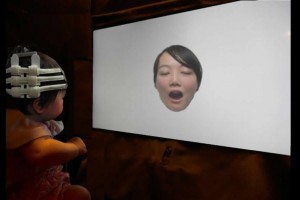Do babies like yawning? Evidence from brain activity
The neural basis for a preference of yawning is apparent in babies as young as 5 months.
Contagious yawning is observed in many mammals, but there is no such report in human babies. Whether babies recognize yawning is an unanswered question.
A new study in Chuo University and Japan Women’s University provides a new insight into this question. It suggested that 5- to 8-month-old babies show face-specific brain activity in response to yawning. This study was published online in Scientific Reports on July 23, 2019.
In this study, at first, researchers focused on the babies’ looking time to yawning and mouth movement: opening mouth and moving tongue sideways against the cheek. In the experiment, 3- to 8- month-old babies were presented yawning and mouth movement side by side, and they looked at the yawning for longer than at the mouth movement. This result suggests that babies in first half-year of their life prefer yawning.
A composite image replicating the experimental scene. The baby, wearing a measurement probe designed for non-invasive near-infrared spectroscopy, is looking at yawning face. The image is credited to Chuo University.
Next, researchers measured the 5- to 8- month-old babies’ brain activity while they viewed yawning and mouth movement each using functional near-infrared spectroscopy (fNIRS). From previous fNIRS studies, it was found that the hemodynamic responses in the occipitotemporal areas increased in response to facial movement because this area plays a role in face processing. Based on such evidence, it was expected that the hemodynamic responses increased when babies were viewing yawning compared to mouth movement. As expected, babies’ hemodynamic response increased in response to yawning, but not to mouth movement. This implies that the neural basis of preference for yawning is seen even in younger babies.
“This is the first study revealing the babies’ preference for yawning, and its neural activity related to yawning processing,” said Shuma Tsurumi from Chuo University.
This is the first study revealing the babies’ preference for yawning, and its neural activity related to yawning processing,” said Shuma Tsurumi from Chuo University.





Related Posts